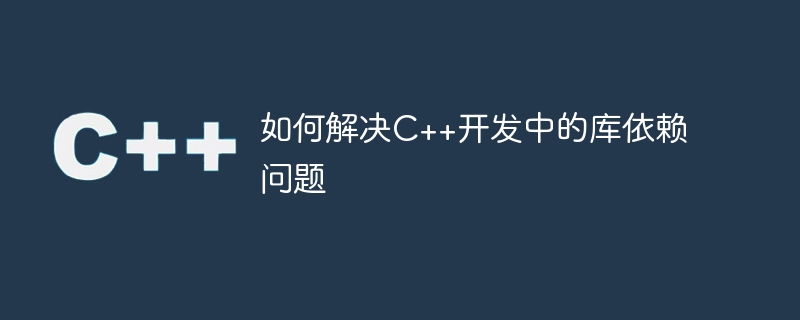Home >Backend Development >C++ >How to solve library dependency problems in C++ development
How to solve library dependency problems in C++ development
- WBOYWBOYWBOYWBOYWBOYWBOYWBOYWBOYWBOYWBOYWBOYWBOYWBOriginal
- 2023-08-22 13:55:452305browse

How to solve the library dependency problem in C development
In C development, the library dependency problem is a common and challenging problem. Since C is a static language, dependencies cannot be dynamically loaded and resolved at runtime like dynamic languages. Therefore, developers need to resolve library dependencies at compile time to ensure that the program can run properly. This article will explore some common solutions to help developers better deal with library dependency issues.
1. Use static linking
Static linking is a common method to solve library dependency problems. Its principle is to compile all dependent libraries into the final executable file, so that the program does not need to load and resolve external dependencies when running. The advantage of this is that the program can run independently of the external environment and is not restricted by dependent library versions. However, static linking also has some problems. First of all, the compiled executable file will become very large and occupy a large amount of disk space. Secondly, if multiple programs use the same library, it will cause a waste of resources. Therefore, using static links requires weighing the pros and cons, and deciding whether to adopt it depends on the specific situation.
2. Use dynamic linking
Dynamic linking is another way to solve the problem of library dependency. Its principle is to provide dependent libraries as independent dynamic link libraries (.dll or .so files), and the program uses these dependent libraries by dynamically loading and resolving dependencies at runtime. The advantage of dynamic linking is that it can save disk space and multiple programs can share the same library file, reducing the waste of resources. In addition, the dynamic link library can be updated at runtime to facilitate upgrades and maintenance. However, there are also some problems with using dynamic links. First of all, you need to ensure that the dynamic link library is correctly installed and configured before running the program, otherwise the program will not run properly. Secondly, if there are multiple versions of the same library in the system, version conflicts may occur. Therefore, using dynamic links requires careful management and attention to version compatibility.
3. Use tools to manage dependencies
In order to better manage library dependencies, you can use some tools to help developers automatically manage dependencies. For example, CMake is a commonly used cross-platform build tool that can automatically generate compilation scripts based on configuration files and automatically parse and manage library dependencies. By using CMake, you can simplify the configuration process of dependent libraries and improve development efficiency. In addition, there are some third-party dependency management tools, such as Conan and vcpkg, which can help developers automatically download, install and manage dependency libraries, making the entire process more convenient and reliable.
4. Use open source community resources
The open source community is a valuable resource library with a large number of open source libraries available for use. During the development process, you can find open source libraries suitable for your project by searching and consulting relevant documents, and use them to solve library dependency issues. Open source libraries often have clear documentation and sample code to help developers better understand and use them. In addition, the open source community also has an active discussion and communication platform, where you can ask other developers for advice and help to solve the problems you encounter.
Summary
Library dependency problem is a common and complex problem in C development. By using static linking, dynamic linking, tools to manage dependencies, and leveraging open source community resources, developers can better solve library dependency issues. No matter which option is adopted, it needs to be weighed and selected according to the specific project needs to ensure that the program can run correctly and stably. At the same time, continuous learning and accumulation of experience, and improving one's ability to solve dependency problems are of great significance to improving development efficiency and quality.
The above is the detailed content of How to solve library dependency problems in C++ development. For more information, please follow other related articles on the PHP Chinese website!

